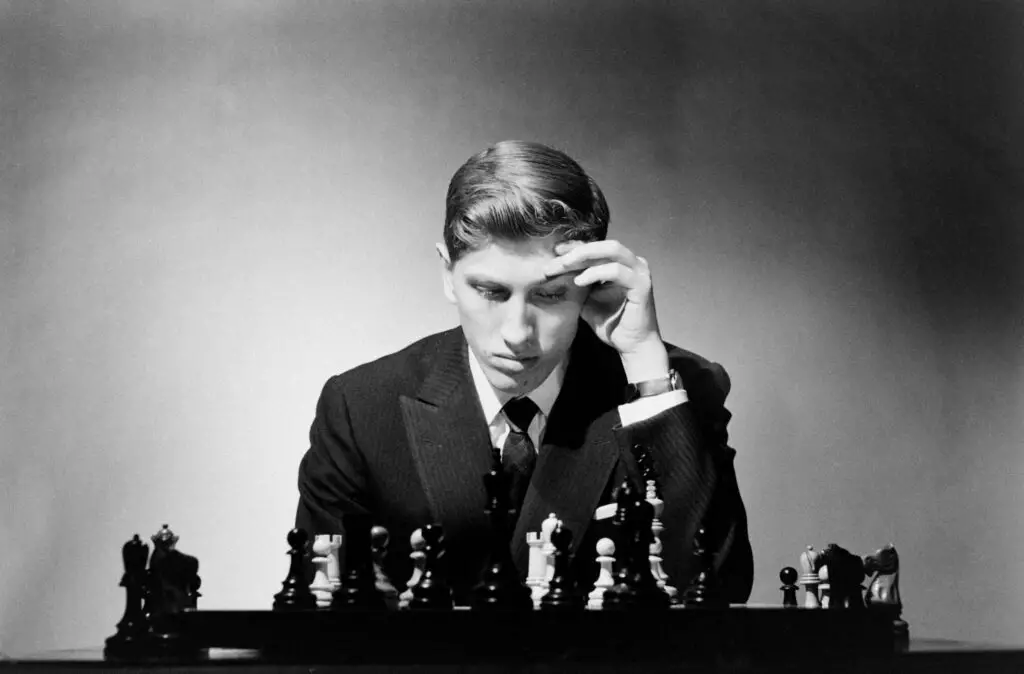
In the realm of chess, few names stand as tall as Bobby Fischer. Renowned for his unparalleled mastery of the game, Fischer’s brilliance extended beyond the chessboard, sparking intense curiosity about his intellectual prowess, particularly his IQ score.
So, what is Bobby Fisher’s IQ? And how has it helped become one of the greatest chess players?
Bobby Fischer’s IQ is estimated to be around 180-187, but no official documented score exists. While his high IQ likely contributed the most to his chess mastery, other aspects such as his exceptional dedication, intuition, and strategic insight also played pivotal roles.
Keep reading to learn more about Bobby Fischer’s achievements in chess and how his IQ contributed to his chess mastery.
Who Was Bobby Fischer?
Bobby Fischer, born Robert James Fischer on March 9, 1943, was an American chess prodigy and grandmaster, widely regarded as one of the greatest chess players in history.
However, Fischer’s genius was accompanied by controversy and eccentricities. His demand for precise playing conditions, intense focus on the game, and outspokenness against the chess establishment made him a polarizing figure.
Despite his complex personality and controversies, Fischer’s legacy as a chess genius endures, inspiring generations of players. He passed away on January 17, 2008, leaving a lasting impact on the chess world and beyond.
Bobby Fischer’s Achievements in Chess
Fischer’s remarkable journey began at an early age when he started playing chess at 6. He rapidly progressed, winning the U.S. Junior Chess Championship at 13, making him the youngest ever to hold the title.
In 1958, at just 15, Fischer became the youngest grandmaster in history, setting a record that held for decades. Then he set out to dominate the U.S. Chess Championships, winning it a record eight times (1958, 1959, 1960, 1961, 1962, 1963, 1964, 1965). His supremacy during these tournaments showcased his consistent prowess and strategic depth.
Fischer’s crowning achievement came in 1972 when he challenged Soviet world champion Boris Spassky in the World Chess Championship. His brilliance prevailed as he defeated Spassky, becoming the first American to win the World Chess Championship and ending Soviet domination.
Following his championship victory, Fischer withdrew from competitive chess for nearly two decades, relinquishing his title in 1975. After a self-imposed hiatus, he returned to competitive chess in 1992 to play a rematch against Spassky. Despite ethical controversies, his victory showcased his enduring skill and competitive spirit.
Bobby Fischer’s influence extended beyond his victories on the chessboard, as his innovative approaches to openings and endgames reshaped the game, and his unmatched ability to calculate variations and foresee outcomes set new standards.
What Is Bobby Fischer’s IQ?
Bobby Fischer’s IQ remains a topic of fascination and debate. While various sources have attributed IQ scores ranging from 180 to around 187, it’s important to note that his IQ was never officially recorded through standardized testing.
The notion of Fischer’s high IQ is often based on anecdotal evidence, such as his remarkable chess achievements at a young age, his ability to learn languages quickly, and his reputation as a highly analytical thinker. He also had an exceptional memory, as demonstrated through his intricate knowledge of chess games, which further fueled speculation about his intelligence.
However, without verifiable documentation of an IQ test, the accuracy of these claims remains uncertain. Fischer’s reluctance to engage with the media and his enigmatic persona added to the mystique surrounding his intelligence.
Did Having High IQ Help Bobby Fischer Become A Better Chess Player?
Having a high IQ likely contributed to Bobby Fischer’s success as a chess player.
A high IQ can enhance cognitive functions such as pattern recognition, logical reasoning, memory retention, and the ability to analyze complex positions. These cognitive skills are crucial in chess, where players must anticipate their opponent’s moves, plan ahead, and adapt to changing circumstances.
Fischer’s ability to quickly grasp intricate chess concepts, his innovative opening strategies, and his deep calculation skills indicate a strong connection between his intellectual capabilities and his chess prowess. His high IQ might have enabled him to process information more efficiently, explore multiple variations, and formulate winning strategies.
However, it’s essential to recognize that IQ is not the sole determinant of chess skill. Practice, experience, dedication, and a deep understanding of the game are equally vital components of success.
Do You Need to Have A High IQ to Play Chess?
You do not need to have a high IQ to play chess.
An IQ score, which stands for Intelligence Quotient, is a numerical representation of a person’s cognitive abilities and intellectual potential. However, it is important to keep in mind that it’s not a comprehensive measure of intelligence.
So, while a higher IQ can potentially provide certain cognitive advantages, chess is a game that can be enjoyed and played by people with a wide range of intelligence levels.
Chess is fundamentally about strategy, critical thinking, and pattern recognition. Players of varying intellectual abilities can develop strong chess skills through practice, study, dedication, and experience.
Skills Required to Be Good at Chess
Becoming a skilled chess player requires a combination of attributes, strategies, and dedicated effort.
Here’s an in-depth look at the skills necessary for chess mastery:
- Strategic Thinking: Chess is fundamentally a game of strategy. A good player must be able to formulate short-term and long-term plans, anticipate opponent moves, and adapt strategies as the game evolves.
- Tactical Acumen: Recognizing and exploiting tactical opportunities is essential. Skill in tactics involves identifying combinations, pins, forks, skewers, and other tactical motifs to gain material advantage or checkmate.
- Pattern Recognition: The ability to recognize common patterns, openings, and endgames is crucial. This enables players to make informed decisions based on their familiarity with established positions.
- Positional Understanding: A deep understanding of pawn structures, piece activity, and key squares helps guide strategic decisions. Positional play involves maneuvering pieces to optimal squares and controlling critical areas of the board.
- Calculation: Calculating possible move sequences and their consequences is vital. Strong players evaluate various candidate moves and assess outcomes before making their decisions.
- Endgame Mastery: A solid grasp of endgame theory is essential. Knowing how to convert material advantages into a winning endgame, as well as defending challenging positions, is a hallmark of skilled players.
- Opening Knowledge: Familiarity with openings and their underlying ideas allows players to establish a strong position from the start. This includes understanding typical plans, pawn structures, and potential tactics.
- Resource Management: Managing time and material resources is crucial. Allocating time wisely and making efficient moves while considering potential sacrifices is essential for success.
- Adaptability: Being flexible and adapting to unexpected situations is key. Good players adjust their plans and strategies as the game unfolds, responding to their opponent’s moves effectively.
- Study and Preparation: Continuous learning is vital. Studying classic games, analyzing one’s own games, and keeping up with modern chess theory contribute to improvement.
- Emotional Control: Maintaining composure under pressure prevents impulsive decisions. Emotional stability helps players think clearly and objectively throughout the game.
- Critical Analysis: Evaluating games, whether you win or lose, helps identify areas for improvement and facilitates the refinement of skills.
- Experience: Gaining practical experience through games and tournaments enhances intuition and decision-making. Playing against a variety of opponents helps refine strategies.
In essence, becoming a good chess player demands a multifaceted skill set encompassing strategy, tactics, adaptability, and a commitment to continuous improvement. While talent and IQ can provide advantages, diligent study, practice, and a passion for the game are the primary drivers behind achieving mastery in chess.
The IQ Scores of Other Famous Chess Grandmasters
The IQ scores of famous chess grandmasters vary, and like Bobby Fischer’s, they are often subject to speculation and anecdotes.
So, here are approximate IQ scores attributed to some renowned chess grandmasters:
- Garry Kasparov: Estimated to have an IQ of around 190-200, Garry Kasparov’s exceptional intelligence is reflected in his dominance in chess and his strategic innovations.
- Mikhail Tal: Tal’s IQ is believed to be in the range of 170-180. His imaginative and aggressive style earned him the nickname “The Magician from Riga.”
- Viswanathan Anand: Anand’s IQ is thought to be around 180-185. His deep understanding of positions and rapid calculation contributed to his successful career.
- Magnus Carlsen: Carlsen’s IQ is estimated to be approximately 190. His exceptional combination of intuition, calculation, and endgame skills has led to his reign as World Chess Champion.
- Boris Spassky: Spassky’s IQ is believed to be around 160-170. His well-rounded skills and versatility contributed to his achievements, including becoming the 10th World Chess Champion.
- Anatoly Karpov: Karpov’s IQ is thought to be in the range of 165-175. His mastery of positional play and endgame technique made him one of the strongest players in history.
- Vladimir Kramnik: Kramnik’s IQ is estimated to be around 160-170. His deep understanding of chess principles and opening innovations contributed to his success.
- Vassily Ivanchuk: Ivanchuk’s IQ is believed to be approximately 170-180. His creative and unpredictable play style has earned him a strong reputation.
It’s important to note that these IQ scores are not officially confirmed through standardized testing, and there can be variations in reported estimates.
Moreover, wwhile intelligence certainly plays a role in chess, these grandmasters’ dedication, years of practice, and unique approaches to the game have been equally significant factors in their success.
Conclusion
In summary, Bobby Fischer’s IQ is widely discussed and speculated upon, but there is no official record of his IQ score.
Fischer’s legacy as a chess prodigy and World Chess Champion, along with his contributions to the game, continue to define his unique place in history, irrespective of his IQ status.
While having a high IQ likely contributed to his success as a chess player by enhancing his cognitive abilities relevant to the game, his dedication to honing his skills and his unparalleled understanding of chess theory played equally significant roles in his rise to becoming one of the greatest chess players in history.
